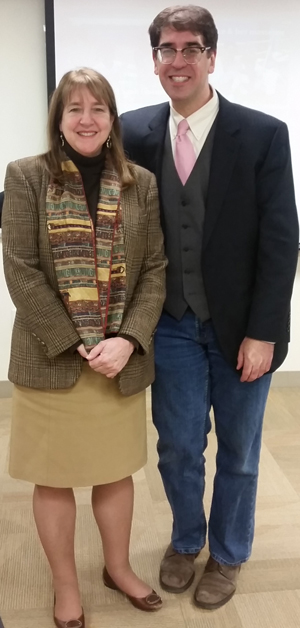Dr. Steven Hatch is no stranger to international medical crises. He has cared for patients in Haiti, Venezuela, Colombia, and Mozambique—and in Liberia, where he worked in an Ebola Treatment Unit in Bong County and trained local medical staff at the John F. Kennedy (JFK) Hospital in Monrovia. Recently, Dr. Hatch shared his experiences with a rapt audience of students, faculty, and staff at a forum organized by the Global Studies and International Relations master’s program.

Dr. Hatch began his talk by urging the audience to stop thinking of Ebola in the popular “sci-fi horror terms.” While acknowledging that Ebola is a terrible disease, for Dr Hatch the real horrors lie elsewhere.
“The real tragedy was a tragedy of infrastructure,” he said. “We saw thousands die not because of the immunology or mutations of the virus, but because of a lack of running water and of facilities that don’t allow, in rural Africa, places for clean hygiene or disease surveillance.”
On the first of several visits to Liberia, Dr. Hatch worked with the country’s leading expert on the disease, Dr. Abraham Borbor, to train medical residents. When Dr. Borbor died of the disease in August 2014, Dr. Hatch felt compelled to return to Liberia to continue the work of his friend and colleague, volunteering in the fall of 2014, at the height of the epidemic, with the International Medical Corps in an Ebola Treatment Unit. At that time, thousands of people were presenting at medical centers across the country with the disease.
“I don’t mean to be melodramatic,” Dr. Hatch said. “But I thought I was on a one-way ticket.”
Dr. Hatch described how Ebola spread rapidly in this first outbreak of its kind to reach urban areas. He outlined the role of the civil wars in Liberia and Sierra Leone in destroying the public health infrastructure, and said that nobody could have predicted an outbreak of such magnitude. He described the extraordinary lengths medical staff went to in order to protect themselves; offered case studies of patients who survived, and others who did not; and emphasized the importance of field work in understanding how problems manifest themselves.
“In Liberia I heard suggestions from Americans that were completely bonkers,” he said. “But they didn’t realize they were bonkers because they weren’t there.”
In addition to presenting the science and epidemiology of Ebola, Dr. Hatch also discussed how the Ebola story played out in the United States, including the panic engendered by some media outlets.
“It’s just a virus,” he said. “Yes, it’s a deadly virus, but it’s just a virus that doesn’t spread very much. The double cheeseburger is a much more lethal threat in the United States than Ebola will ever be.”
Students and professors alike were riveted throughout the two-hour talk and asked questions about how a future epidemic can be prevented; the impact that Ebola has had on cultural practices; the stigma attached to former patients; the role of survivors in taking care of patients; and the role of communications in supporting the response to the epidemic.
“Students and faculty were impressed by the unassailable authority of Dr. Hatch’s first-hand experience,” said Mary Thompson-Jones, director of the program. “He took the topic of global health and told us all why it matters. His talk is a dramatic example of our efforts to link students to real-world practitioners – in the classroom, through our faculty, as well as through our occasional speaker series.”